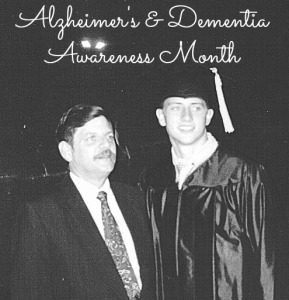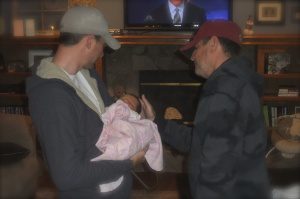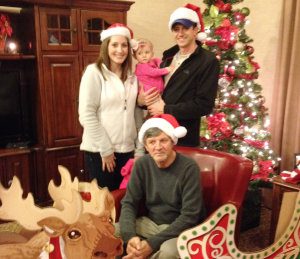 No one wants to become a caregiver for an ailing parent. No one wants to see their loved one become someone unrecognizable seemingly overnight. And I assure you, no one wants to be in the middle of planning their wedding and get a phone call from police in Oklahoma stating they found your father driving aimlessly around town; when he was stopped and questioned, he didn’t seem to know where he was going or what he was doing.
No one wants to become a caregiver for an ailing parent. No one wants to see their loved one become someone unrecognizable seemingly overnight. And I assure you, no one wants to be in the middle of planning their wedding and get a phone call from police in Oklahoma stating they found your father driving aimlessly around town; when he was stopped and questioned, he didn’t seem to know where he was going or what he was doing.
I first met my father-in-law, Roger, in May 2008 when my husband and I were dating. My in-laws are divorced, so we split our time during the trip so I could have a chance to meet everyone. Back then, Roger was a computer programmer for a major hospital system in Oklahoma. He owned a home, worked full-time and shared custody of his young daughter. He seemed like a fully-functioning adult with no outward signs of slowing down.
The second time I met my father-in-law was in December 2008. During this visit, we noticed Roger’s home was messier than normal – something out of the ordinary for a man described as borderline OCD by his loved ones. He had also taken a leave of absence from work. Roger had recently complained of back and neck pain – he’s had several back surgeries in the past. Chronic pain is a good excuse for daily housework to go by the wayside so we didn’t think much of it at the time.
Over the next year and a half, Justin and I became engaged and started planning our wedding. We live 3.5 hours away from Justin’s family but we visit as much as we can and he speaks to them on the phone often. Justin’s conversations with his dad grew fewer and farther apart. When they did speak, Roger seemed confused on the phone. He had a hard time following the conversation or would tell the same stories over and over again. He quit working permanently and fell behind on his bills. After Justin received the phone call from local police, Justin’s grandmother – a feisty 80+ year old woman who still works as a waitress in her small hometown – suggested Roger come live with her for the time being. She could help him manage his medicine and make sure he made it to doctor appointments. Most of all, she could help keep him safe while the family tried to figure out exactly what was going on.
In April 2011, Justin and I got married. Roger was there and seemed to be doing really well after moving in with his mom. A few months after our wedding, we got a call from Justin’s grandma – Roger left and had decided to get his own apartment in Tulsa. She was worried and asked Justin to find him and figure out a long-term plan. As newlyweds, we weren’t prepared to do any of this. We shouldn’t have to be doing any of this. We were 26 and 29 years old – too young to have parents that were sick and needing our help.

After visiting Roger in December 2011 and seeing his living conditions, we ultimately decided to move him into an apartment in Kansas City so he would be near us. We could visit him on a daily basis if needed and it’d be easier to manage his affairs and get him to the correct doctors to finally figure out a diagnosis.
At 56 years old, my father-in-law was diagnosed with dementia – specifically, Primary Progressive Aphasia (PPA), a rare degenerative brain disease that affects the person’s ability to recognize and form words and, later, understand spoken language. As the disease progresses, the person becomes more like an Alzheimer’s patient and is unable to properly care for themselves. The two diseases are closely related; one can be mistaken for the other.
Roger’s doctors at KU Medical Center started him on medicine to help slow the progression of the disease and we went on with our new normal – newlyweds and, essentially, caregivers. After 10 months in Kansas City, we realized Roger was no longer safe living on his own and needed to be somewhere better suited to handle the changes in his behavior. We worked with A Place for Mom to find an independent living facility that would welcome Roger. He’d have his own apartment, but the staff would disperse his medication, make sure he was present for meals and keep an eye on him when we could not.
 In December 2013, Roger was asked to leave his independent living facility. The staff felt they were no longer equipped to have a patient whose disease had progressed as much as Roger’s had during his short stay. We worked with our local A Place for Mom counselor again to find Roger an assisted living facility with a memory-care unit where patients were on lockdown. He’s adjusted well, and Justin and I trust the staff to keep him safe and as healthy as possible. At this point, three years after we first really noticed symptoms and at the age of 59, Roger cannot communicate with others and needs assistance with bathing, eating and dressing. He spends his days with other Alzheimer and dementia patients, interacting with them and the staff as much as he can.
In December 2013, Roger was asked to leave his independent living facility. The staff felt they were no longer equipped to have a patient whose disease had progressed as much as Roger’s had during his short stay. We worked with our local A Place for Mom counselor again to find Roger an assisted living facility with a memory-care unit where patients were on lockdown. He’s adjusted well, and Justin and I trust the staff to keep him safe and as healthy as possible. At this point, three years after we first really noticed symptoms and at the age of 59, Roger cannot communicate with others and needs assistance with bathing, eating and dressing. He spends his days with other Alzheimer and dementia patients, interacting with them and the staff as much as he can.
I’m not telling you this story for pity; it’s part of our life and we wouldn’t have done it any differently. November is National Alzheimer’s Disease Awareness Month and sharing our story is one way I can help raise awareness of Alzheimer’s and dementia. Alzheimer’s affects more than 5.1 million people and half a million people younger than 65 are thought to have some sort of dementia. We were thrown into this without any warning and without any resources. If you or anyone you know is going through this with a loved one, these sites or organizations may be able to help:
- Alzheimer’s Association
- Alzheimer’s Association – Heart of America Chapter
- National Institute on Aging
- A Place for Mom
- Kansas Department for Aging & Disability Services
- Missouri Association of Area Agencies on Aging
More than anything, our experience has opened up a dialogue between my husband and I when it comes to planning ahead should either one of us get sick in the future. I’ve asked my own parents and family members to do the same. I can’t blame my father-in-law for not having a plan in place; no one plans on succumbing to the affects of dementia before they’ve even reached retirement age. Justin and I were left to make these decisions on our own, keeping his best interests in mind. It’s not the type of relationship I imagined I’d have with my father-in-law, but he’s here and he’s a part of our lives. We know he’s safe and we’ll make the most of the time we have left together.

















I just wanted to thank you for writing such a wonderful article about your father in law and for describing PPA so well. My father also had PPA and actually just passed away peacefully this past weekend after a long 12 years of fighting. It is nice to see we are not alone in the battle with this rare dementia. Thank you for explaining it so well and describing your father in law with such dignity. Your family will be in my thoughts and prayers.
So sorry to hear about your dad, Anni. PPA is such an awful disease to watch, especially in someone so young, but you are right – it is definitely nice to know we are not alone. Thank you for your kind words and your family will be in my prayers as well.
Mackenzie,
To introduce myself, Roger and I were in the same graduating class of 1973 from Afton High School. I am so sorry to hear this news and at the same time so happy to know Roger has a caring family like yours to be there for him.
This also hits very close to home as my Brother-In-Law has recently been diagnosed with Alzheimer’s. He seems to be doing very well with the medication from his doctor, so far. I try to get back to Oklahoma once or twice a year to see him and my sister.
I cannot imagine the sacrifices you and your family must make on a daily basis and Roger is so fortunate to have this type of support. Today’s fast pace lifestyle everyone gets caught up in doesn’t make it easy to care for families in situations like this and it is an inspiration for us all to hear of such deviation.
I have supported the Alzheimer’s Foundation in the past and will continue to do so in the future.
God Bless you and your family.
Allen,
Thank you so much for commenting. What a small world. I never expected this to reach someone who knew Roger on a personal level so many years ago, but I’m glad it did! We make it through Afton a few times a year as Roger’s mom still lives there.
It’s a scary disease to watch but knowing Roger has the appropriate care is a little more comforting. Hopefully as research progresses doctors will be able to find additional medications or therapies to at least slow the progression down. The thing that shocked us the most was how fast Roger declined. I hope that’s not the case with your brother-in-law and that he continues to do well.
Mackenzie